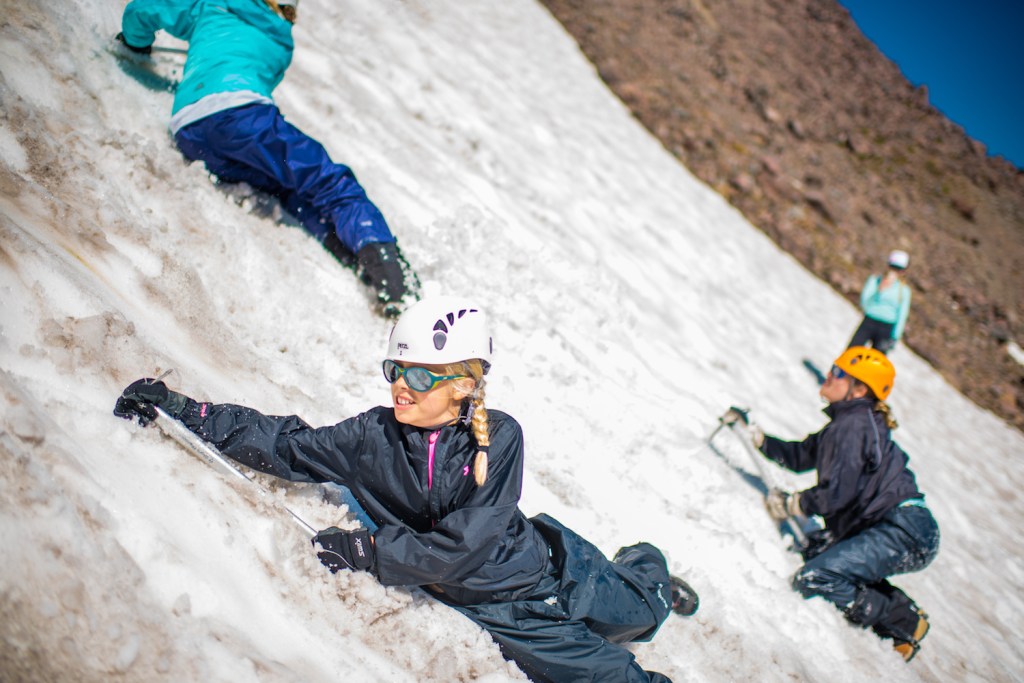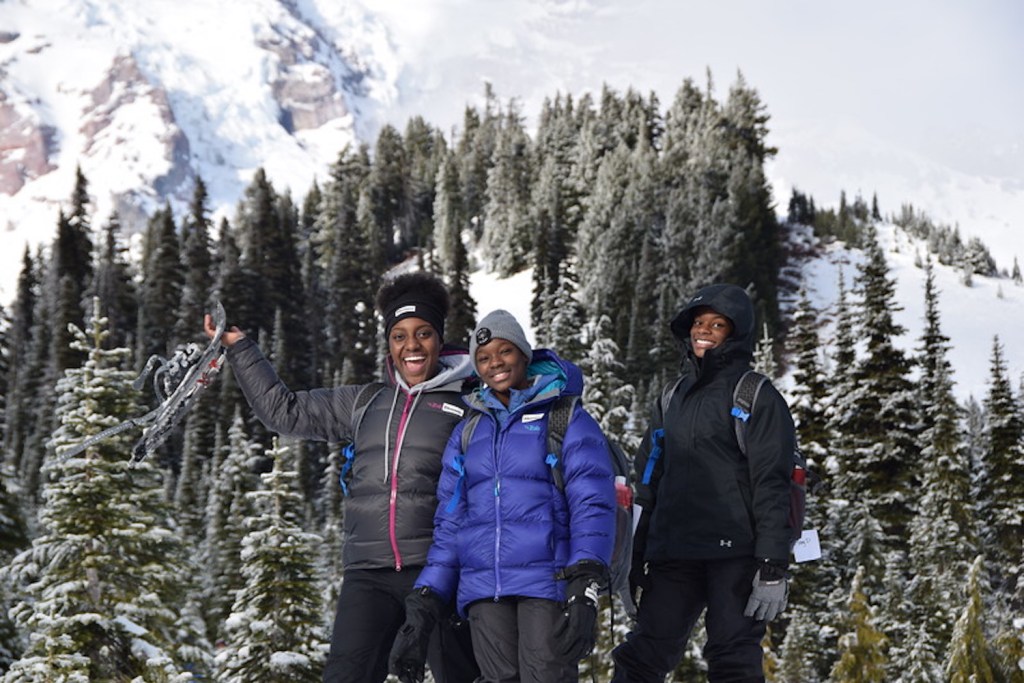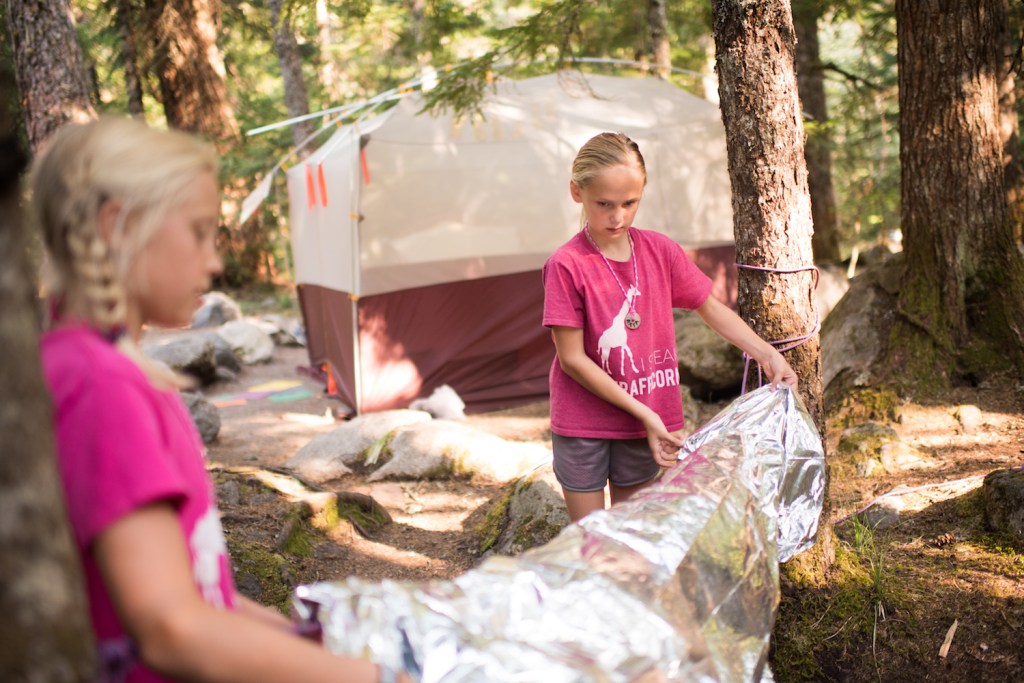On a cloudy Saturday morning in early February, 65 girls—some as young as six years old—convened at Jackson Hole Mountain Resort for the ski area’s first SheJumps Wild Skills Junior Ski Patrol day camp. The girls learned the basics of first aid, snow science, avalanche control and rescue, toboggan technique and mountain communication, essential skills for any ski patroller to have.
Of course, there were unicorn costumes and hot chocolate breaks, but at the very core of this all-girls’ day camp, second to having fun, is a mission that Wild Skills Director Christy Pelland holds close to her heart: empowering youth through outdoor education.
“I grew up looking at Mount Rainier every day and I didn’t know that regular people like me could climb that until I was an adult,” said Pelland. “Being able to introduce kids, and girls especially, to that option and teach them the skills to achieve that, it’s awesome. Kids are smarter and much more capable of doing things in the outdoors than people give them credit for.”

Girls in SheJumps’ Wild Skills clinics learn to self arrest on Mount Rainier. (Photo Courtesy of SheJumps)
From mountaineering courses to wildland firefighting camps, SheJumps, a nonprofit that aims to get more girls and women into the outdoors, is not the only program helping kids gain necessary backcountry skills. Nationwide, programs similar to Wild Skills are becoming increasingly common. Where offerings from the National Outdoor Leadership School and Outward Bound have historically catered to young adults, programs like The Mountaineers in Seattle and the Kent Mountain Adventure Center in Estes Park, Colorado, are stepping up to provide opportunities for preteens and even younger kids.
Some may argue that high-alpine expeditions and mountaineering courses are too risky for kids, but recent research suggests that these outdoor-based learning environments are well-suited for those novelty-seeking adolescent minds. That teens tend to be bigger risk takers than adults is old news, but a 2017 study in the Journal for Cognitive Neuroscience shows that adolescents’ risk-taking tendencies may actually help them learn faster. Pelland has seen that research play out firsthand during the Wild Skills courses.
“When you’re talking about analyzing snow science or you’re digging pits or you’re learning how to read the snowpack, you’re building on all of those subjects you’re studying in school, but the lessons are more real,” said Pelland. “They’re not just worksheets.”
Kit DesLauriers is a ski mountaineer sponsored by The North Face who, in 2006, became the first person to ski off the summit of Everest. She’s also a mother to two girls, one of whom attended Jackson Hole’s Junior Ski Patrol camp this winter. DesLauriers said it’s that real-life practicality, and the real-life risks, that make experiences in the mountains so formative for kids.
“There are not kid versions of the mountains and adult versions of the mountains,” said DesLauriers. “The mountains are the mountains. When you’re a kid, especially in a place like Jackson Hole, when you learn to ski, you learn the terrain, you learn the realities, you learn the dangers, you learn the weather and the conditions. I think time in the mountains helps foster a bigger awareness of your surroundings and yourself.”

The Mountaineers, in Seattle, teaches youth and adult programs on rock climbing, mountaineering and other outdoor skills. (Photo Courtesy of The Mountaineers)
Autonomy, identity development, conflict resolution, risk management, leadership, stewardship. These are just a few of the benefits that youth experience when engaged in outdoor recreation, according to research from the National Recreation and Park Association. Andy Bassett, youth education manager for The Mountaineers, said that the skills gained while rock climbing, for example, aren’t just limited to the mountain: they’re lessons for everyday life.
“Because there’s more expectation, the kids rise to the occasion,” said Bassett. “All of this is super transferrable. Being able to manage fear 1,000 feet off the ground and to be able to still perform is directly applicable to managing a huge class load in college. I think in this society we view risk as being very negative, but risk is essential.”
Take Keely Carolan, a high school senior and now the president of the Mountaineers Adventure Club (MAC). She has participated in MAC for four years, transitioning from a beginner climber to her current role as club president and instructor. For Carolan, MAC has become more than just a place to learn outdoor skills. It’s her second family, a community in which she’s felt comfortable taking chances (and sometimes making mistakes) while growing into her own person.
“When I first joined, most of the skills we were learning were totally new to me, and I had to learn how to be humble and to learn from my peers,” said Carolan. “Now I am in the position of being able to teach others. I have become much more confident and outgoing from my time spent in MAC. Learning how to assert yourself and communicate clearly and effectively is a necessary life skill that I have been able to develop through all the opportunities MAC has given me.”
Participants in MAC (which focuses on youth ages 14-18) have tackled some pretty extraordinary adventures. Climbing Mount Rainier without a guide. Swapping leads with the Mountaineers staff up The Chief in Squamish. Summiting Mount St. Helens. But as impressive as these feats are, it begs the question: Is there such a thing as too much, too soon?

She Jumps participants learn to build an emergency shelter. (Photo Courtesy of She Jumps)
Kent Mountain Adventure Center Director Dustin Dyer doesn’t think so. In March, two girls were found after getting lost and spending two days in the woods surrounding their California home. The Humboldt County sheriff credited the 8- and 5-year-olds’ knowledge of basic wilderness skills, learned from their time at 4-H, to the girls’ survival. Dyer said it’s crucical to not only teach kids these backcountry skills but to also provide a safe environment for them to make decisions on their own and possibly fail.
“Their lives are very organized by parents—‘go to this camp and this after-school event and this extracurricular,’” said Dyer. “But once they get here, this is their camp. It’s one of the first times for a lot of these kids that somebody steps back and goes, ‘You’re in charge, what are you going to do?’”
Whether or not kids decide to keep climbing or skiing into adulthood is beside the point, added DesLauriers. Ultimately, the experiences that these organizations provide are meant to empower adolescents with the tools and support to make well-informed decisions, try new things and discover who they want to be.
“It doesn’t matter if they become engineers or financial investors or scientists or ski patrollers,” DesLauriers said. “What we should do is show our next generation that they can do whatever it is they want to do.”
